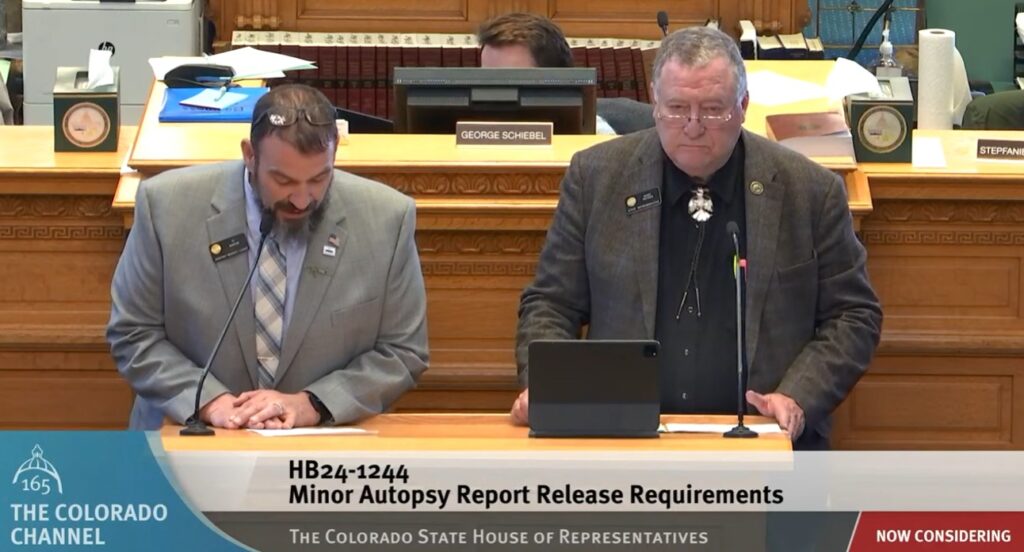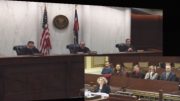By Jeffrey A. Roberts
CFOIC Executive Director
County coroners could publicly release an autopsy report concerning a minor’s death while in the care or custody of a government agency under a revised bill passed by the Colorado House on Monday.
As introduced, House Bill 24-1244 did not permit the public disclosure of any autopsy report on the death of a minor unless a judge determined that doing so “substantially outweighs any harm to the privacy interests of the deceased” and family members.
Lawmakers added the new provision, allowing disclosure of certain reports, following a committee hearing in which journalists and child-protection advocates pointed out the public-interest benefits of keeping all autopsy reports open, as they have been for many years.

“There was a lot of conversation about how we can investigate deaths that happened within the custody of the state when a lot of these kids are unnamed, unknown or not cared about,” said Rep. Leslie Herold, D-Denver. “We worked with the bill sponsors and the proponents of the bill to come up with an amendment that would say if someone died within the custody of the state, that the autopsy would be released and made public.”
Under the Colorado Open Records Act as currently written, autopsy reports specifically are excluded from a disclosure exemption for medical records. An autopsy report on a homicide victim of any age may be withheld from a requester only under the legal procedure specified in CORA for denying access based on “substantial injury to the public interest.” A coroner must apply to the district court for an order authorizing the withholding of an autopsy report under that standard.
Proponents of HB 24-1244 say confidentiality is needed for minors’ autopsy reports to protect the privacy of grieving families of victims. Members of the House Judiciary Committee heard emotional testimony earlier this month from relatives and friends of 17-year-old Riley Whitelaw, who was murdered at a Colorado Springs Walgreens in 2022. “The release of Riley’s autopsy and the information shared by news and social media has forever negatively impacted my life, my family and Riley’s friends,” her mother, Courtenay Whitelaw, told legislators.
The amended bill, sent to the Senate on a 61-2 House vote, now says that a coroner may provide a copy of an autopsy report on the death of someone under 18 “if the death occurs while the minor is in the custody or under the supervision of the state or a local government, including a law enforcement agency, a detention facility while under foster care, or in a public school.”
The language of the amended bill seems to give a coroner the discretion to withhold an autopsy report on a minor who dies in the custody or care of the government. The new provision also does not provide for the release of autopsy reports on children who die in licensed and unlicensed day care centers or in other circumstances while under the supervision of non-governmental agencies and caregivers.
Other autopsy reports on minors could only be disclosed to a parent, legal guardian, law enforcement agency or other parties and agencies designated in the bill. However, coroners would be required to release certain basic information pertaining to the death of a minor, if someone makes a request, but not the minor’s name: 1) cause of death; 2) time, place and manner of death; and 3) age, gender and race or ethnicity of the deceased minor.
During the judiciary committee hearing, lawmakers also heard from advocates including Kelly Garcia-Brauch, a former caseworker and child-welfare supervisor, who cited investigative reporting that relied on autopsy reports to uncover flaws in the child-welfare system, leading to reforms. “When a child dies as a victim of a crime or under suspicious circumstances, that child cannot speak for him or herself — that child has no voice,” she said.
Sealing autopsy records would compound the tragedy of child deaths “in an untold number of instances,” testified 9NEWS investigative reporter Kevin Vaughan, a board member of the Colorado Freedom of Information Coalition. “It would give sanction to failing, neglecting and abusing children to death in anonymity and secrecy.”
The legislature tried to seal autopsy reports on minors in 2018, but then-Gov. John Hickenlooper vetoed the bill, writing that “sunshine on uncomfortable and painful topics such as youth deaths can lead to more positive outcomes for other youths.”
Follow the Colorado Freedom of Information Coalition on Twitter @CoFOIC. Like CFOIC’s Facebook page. Do you appreciate the information and resources provided by CFOIC? Please consider making a tax-deductible donation.




